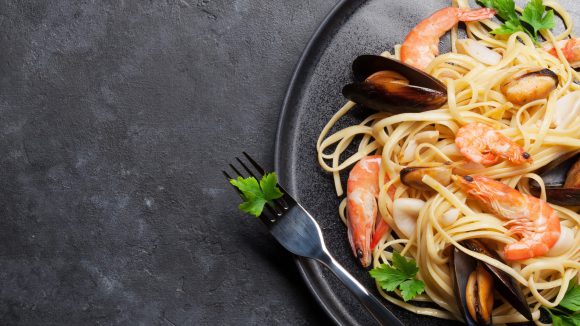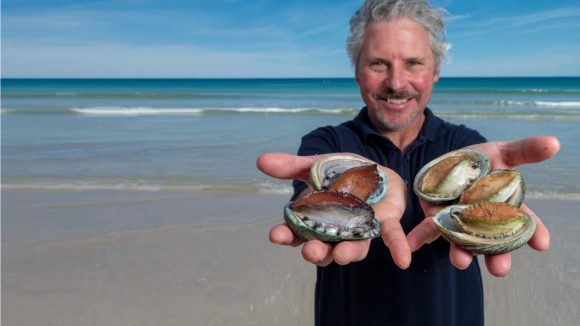
Learn more about grouper
The classification of fish is complex, and has no bearing on a delicious dish of delicately flavoured grouper served in a restaurant, or cooked at home. However, it is interesting to note that globally, many species of fish are known by the general name ‘grouper.’
Most of these belong to the genera Mycteroperca and Epinephelus, and number more than 230 species in total. Groupers are economically important for artisanal fisheries and are among the highest priced species in many Asian fish markets, often being sold live.
In the wild
Groupers are widely distributed in warm seas, in both deep water and shallow reef areas. Many are dull green or brown in colour, but some have bright, bold patterns. Those inhabiting deep water tend to be much redder in colour than those living near the shore.
These fish are teleosts, which are characterised by a movable upper jaw that protrudes when their large mouths are opened.
Groupers are not sleek, speed or distance swimmers, but tend to have large bodies. Size and weight vary with the species, but they can grow to over one metre in length. The largest is the Atlantic goliath grouper (Epinephelus itajara), which can reach 2.5 metres in length and weigh up to 450kg!
Most groupers are solitary fish, cruising the reefs and shallows for their prey. Their mouths and gills form a powerful vacuum, which enables them to suck in fish, octopuses and crustaceans, which are swallowed whole. Heavy tooth plates in the pharynx help to break down their food. Mouths are also used to dig shelters in sand and under rocks.
A variety of capture methods are used to catch groupers, including handline, nets and trawling gear. In coral reef areas, where it can be difficult to catch groupers using conventional nets, illegal fishing methods are sometimes used, including explosives and poisons, despite the efforts of authorities to stop this practice. As a result, several species of grouper have been listed as near endangered or endangered, and the development of farming techniques for grouper is welcome, in order to supply market demand and reduce fishing pressure.
Farming grouper
A little-known fact about groupers is that they start their mature life as females, before some of the larger fish later change into males. In wild grouper populations, the big males tend to be fished out first, which results in an imbalance in the sex ratio and threatens reproduction of the species.
Taiwan has been ranching wild-caught juveniles since 1975, but captive breeding was hampered by a lack of males, until Taiwanese researchers successfully developed methods to artificially trigger sex change. Other countries followed suit, and now more than a dozen grouper species can be grown in aquaculture, from egg to plate. Most grouper are currently farmed in Asia, in countries such as China, Taiwan, Indonesia, Malaysia, Japan and Vietnam. Farms may use water recirculation tanks on land, net cages at sea, or coastal ponds.
According to the Food and Agriculture Organisation of the United Nations (FAO), the demand for grouper reached 500,000 tonnes in 2020, which was supplied equally by fishing and aquaculture. It is hoped that the development of new aquaculture techniques to produce grouper eggs and juveniles, will see rapid development of the sector over the next decade.
Groupers are included in the ASC Tropical Marine Finfish Standard, which covers a range of tropical fish species including snappers, pompano, barramundi and croaker.
The ASC’s programme requires farms to be independently assessed and to provide a high level of transparency, by making all the audit reports publicly available on its website.
Impacts of farming Grouper
The farming of tropical marine finfish, including grouper, has been associated with a number of environmental impacts, such as the use of marine ingredients in feed, negative impacts on biodiversity, disease and parasite transfer, and pollution affecting water quality and the seabed.
ASC certified tropical marine finfish farmers must work hard to improve standards in their industry, work with their local community, and respect their workers and the environment.
Water quality
ASC certified tropical marine finfish farms are required to test water quality regularly, to ensure that levels of oxygen, temperature, acidity, and other metrics, remain within set limits.
Biodiversity
ASC certified tropical marine finfish farms minimise impacts on the local ecosystem in a number of ways, such as the development and implementation of a biodiversity-focused impact assessment, ensuring farms are not sited in or near critical habitats. Certified farms cannot be set up in mangrove ecosystems, and producers must make every effort to minimise fish escapes.
Feed
ASC certification requires all certified farms to adhere to strict limits that minimise the use of wild fish as an ingredient in feed. Farms must also ensure full traceability back to a responsibly managed source, preferably certified, both for wild fish and non-marine ingredients including soy and palm oil.
Diseases
ASC certified tropical marine finfish farms must have a Fish Health Management Plan in place, to minimise disease outbreaks and maintain a biosecure environment. The use of medicine before a disease is diagnosed (prophylactic use) is prohibited, and fish farmers must manage farms to ensure low mortalities.
Social responsibility
ASC certification requirements are based on the core principles of the International Labour Organisation (ILO), and include the prohibition of child labour and forced labour. All ASC certified farms must be safe and equitable working environments, where employees earn a decent wage and have regulated working hours. Farmers have to engage with local communities, and inform them about potential health and safety risks or changes in access to resources.
Cooking with Grouper
Grouper are a mild-tasting white fish, with a high oil content and large flakes, and are great for roasting, baking, grilling, frying, smoking or steaming. These fish and their fillets are great served simply with lemon, but are equally delicious picking up stronger flavours in recipe dishes. Packed with protein and Omega 3 fatty acids, grouper is an excellent choice for a meal with a difference. And, by choosing grouper certified by the ASC, you can be reassured that you are also helping the environment, which means that your meal is good for you and good for the planet.
Explore More

Learn more about Seafood Farming
Find out how farmed seafood can help feed a growing global population, why fish farming needs to be done responsibly and how you can make a responsible choice.

Visit our Blog
Find out what’s behind the label, what’s going on in the world of aquaculture and how the Aquaculture Stewardship Council is updating and improving its programmes regularly.

The Aquaculture Stewardship Council
We run the world’s leading certification programme for responsibly farmed seafood. Learn about our Certification Programmes and our Impact.



